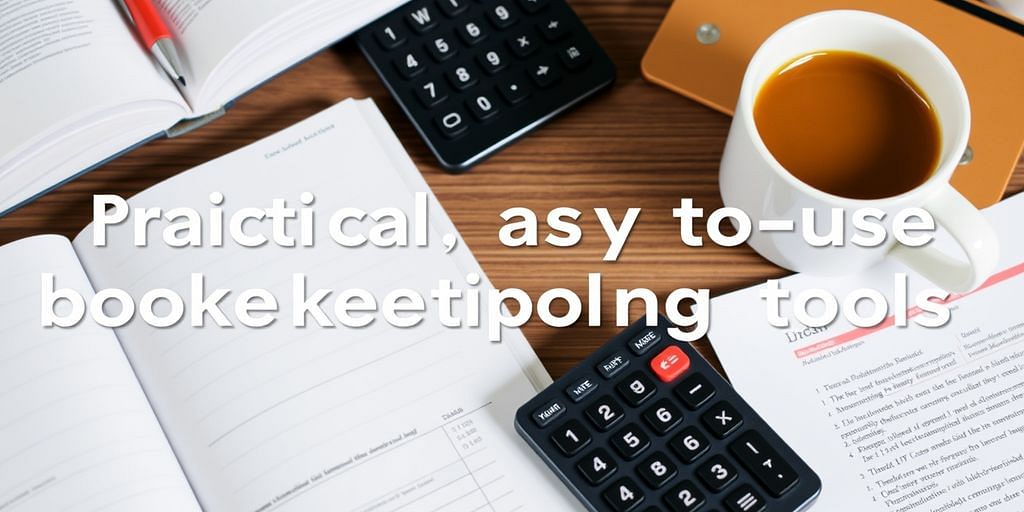
Top 10 Bookkeeping Books Every Aspiring Accountant Should Read
Back To BlogBookkeeping All-In-One For Dummies
If you're just starting out with bookkeeping, "Bookkeeping All-In-One For Dummies" by Lita Epstein is the perfect guide. This book combines five different books into one, covering everything from basic bookkeeping to reading financial reports. It's a comprehensive resource that simplifies complex concepts.
You'll learn how to:
- Set up ledgers and journals
- Record transactions accurately
- Produce balance sheets and year-end reports
- Manage taxes effectively
One of the best features of this book is its practical exercises. These exercises help you review what you've just learned, making it a great choice for those who like to learn by doing. Combining this book with the Bookkeeping Workbook for Dummies can be especially beneficial.
Dive into essential strategies, simplify complex concepts, and gain financial clarity for business success.
Overall, this book is a must-read for anyone looking to get a solid grasp on bookkeeping. It's one of the top 10 bookkeeping books every accountant should read.
Alpha Teach Yourself Bookkeeping in 24 Hours
If you're looking to dive into bookkeeping quickly, Alpha Teach Yourself Bookkeeping in 24 Hours by Carol Costa is a fantastic choice. This book is designed for beginners and is laid out in a logical manner, making it easy to follow. Each chapter takes about 1.5 to 2 hours to complete, so you can realistically finish it in a few days if you stay committed.
One of the best features of this book is its comprehensive approach. It covers everything from daily finances to double-entry bookkeeping, managing taxes, and understanding financial statements. This makes it an excellent resource for small business owners who want to get a handle on their books without spending a fortune on training.
- **Key Takeaways: **
- Perfect for self-learners and small business owners.
- Comprehensive yet easy to understand.
- Practical exercises to apply what you've learned.
This book is a great starting point for anyone new to bookkeeping. It's straightforward, detailed, and incredibly useful for managing your finances effectively.
E to Z Bookkeeping (Barron’s E-Z Series)

If you're looking for a solid refresher on bookkeeping, E to Z Bookkeeping by Kathleen Fitzpatrick and Wallace W. Kravitz is a great pick. This book is not just a textbook; it's more of a workbook designed to help you apply what you learn right away. It's perfect for those who already have some bookkeeping knowledge but need a quick brush-up.
One of the best features of this book is its practical approach. It includes numerous examples and practical problems that you can work through. This hands-on method makes it easier to grasp the key concepts and apply them in real-world scenarios.
You'll learn about:
- Journals and ledgers
- Financial statements
- Special journal entries
- Applying bookkeeping fundamentals in business scenarios
At the end of each chapter, there are quizzes to help you gauge how much you've learned. These quizzes are super helpful for reinforcing the material and ensuring you're ready to handle bookkeeping tasks in a business setting.
This book is a valuable resource for anyone looking to strengthen their bookkeeping skills without getting overwhelmed by too much information at once.
Full Charge Bookkeeping, HOME STUDY COURSE EDITION
If you're looking for a bookkeeping manual that doesn't require a ton of time, this book is a great pick. It's perfect for those who want to bridge the gap between bookkeeping knowledge and real-world job functions. While it's not a comprehensive textbook, it offers a solid overview for beginners and intermediate learners.
The book is well-organized, starting with 112 pages of bookkeeping concepts and appendices. The next 40 pages provide a study outline, and the final 20 pages are designed to test your understanding. This structure makes it easy to follow and apply what you've learned.
Key Features
- Checklists like “new job checklists” and “master calendar” to help you stay organized.
- Various forms and schedules that are essential for maintaining a company's books.
- A brief overview of each topic, making it easier to grasp the basics.
This book is a great resource for those who already have some bookkeeping knowledge and want to apply it in a professional setting. It's not for advanced bookkeepers, but it's a fantastic starting point for those at a beginner or intermediate level.
Bookkeeping Made Simple: A Practical, Easy-to-Use Guide to the Basics of Financial Management

If numbers make you nervous, this book by David A. Flannery is here to help. It's perfect for beginners who want to get a grip on bookkeeping without feeling overwhelmed. The book breaks down the basics of financial management into easy-to-understand sections.
You'll learn about:
- Assets and equities
- Journal entries
- Adjustments in accounts
- Preparing financial statements
- Petty cash statements
- Payroll
- Partnerships
- Closing the books
Many teachers use this book as a reference, creating practice tests for their students. While it has some typos and errors, it's still a valuable resource for understanding the fundamentals. We recommend using it as a supplementary guide rather than a primary textbook.
This book simplifies accounting fundamentals and is an invaluable resource for accounting students, business owners, and bookkeepers.
Whether you're a small business owner or just someone looking to understand the basics, this book covers everything from setting up a bookkeeping system to planning for taxes. It's a great way to master the complete accounting cycle and get comfortable with the math involved in bookkeeping and accounting.
Keeping the Books: Basic Recordkeeping and Accounting for Small Business
If you're a small business owner, "Keeping the Books: Basic Recordkeeping and Accounting for Small Business" by Linda Pinson is a must-read. This book is perfect for those who are just starting out and need a straightforward guide to bookkeeping. It's not for advanced bookkeepers, but it's excellent for beginners who need to learn the basics from scratch.
You'll learn how to:
- Set up ledgers and journals
- Record transactions accurately
- Produce balance sheets and year-end reports
- Manage taxes effectively
One of the best features of this book is its practical exercises. These exercises help you review what you've just learned, making it a great choice for those who like to learn by doing. Combining this book with the Bookkeeping Workbook for Dummies can be especially beneficial.
Dive into essential strategies, simplify complex concepts, and gain financial clarity for business success.
Overall, this book is a must-read for anyone looking to get a solid grasp on bookkeeping. It's one of the top 10 bookkeeping books every accountant should read.
Bookkeeping the Easy Way (Easy Way Series)
If you're looking for a straightforward guide to bookkeeping, "Bookkeeping the Easy Way" by Wallace W. Kravitz is a great choice. This book breaks down complex financial concepts into short, easy-to-understand chapters, making it perfect for beginners. It's a must-read for anyone wanting to build a solid foundation in bookkeeping.
One of the standout features of this book is its focus on the double-entry bookkeeping system. Before diving into software like QuickBooks, it's crucial to understand these fundamentals. The book also covers essential topics like retailing and merchandising, making it comprehensive for small business owners.
You'll find practical tips and examples throughout the book, which help simplify the bookkeeping process. Whether you're new to bookkeeping or looking to improve your skills, this book is a valuable resource for maintaining accurate financial records.
This book is not just for small businesses; individuals can also benefit from it by teaching themselves basic bookkeeping.
Bookkeeping Essentials: How to Succeed as a Bookkeeper
If you're looking to master accounting best practices, "Bookkeeping Essentials" is a must-read. This book is a powerful companion for anyone navigating the ever-changing world of today's accountant and bookkeeper. It provides practical solutions for potential issues you may encounter, making it a great resource for those who already have the bookkeeping basics nailed down.
Key Features
- Perform a wide variety of financial transactions
- Use key concepts and skills with real-world bookkeeping problems
- Design a bookkeeping system
- Track day-to-day business operations
- Keep journals for active accounts
- Use blank working papers and spreadsheets
- Handle cash entries and develop internal controls
- Calculate and pay employee withholding taxes
- Depreciate assets
- Prove out your books at year's end
- Prepare tax returns and set up for a new year
Bookkeeping Essentials is not just a book; it's a toolkit for success in the bookkeeping world. Whether you're dealing with small business services or larger financial operations, this book has got you covered.
This book may not be the best for those without prior knowledge about bookkeeping, but it’s a great resource for those who already have the basics down and just need guidance in turning their ideas into a successful bookkeeping business.
Bookkeeping Basics: What Every Nonprofit Bookkeeper Needs to Know
If you're diving into the world of nonprofit bookkeeping, this book by Debra L. Ruegg and Lisa M. Venkatrathnam is a must-read. It's perfect for those who have no background in bookkeeping or accounting but want to manage a small nonprofit effectively. The book breaks down complex concepts into simple, easy-to-understand parts, making it accessible for everyone.
One of the standout features of this book is its practical approach. You'll find step-by-step instructions on setting up a bookkeeping system, solving common issues, and even applying for bookkeeping positions in nonprofits. It's a great resource for anyone looking to get started quickly and efficiently.
Key Takeaways
- Many nonprofits can't afford to hire a trained bookkeeper. This book helps you save costs by teaching you how to manage your books in your spare time.
- Along with the basics, you'll get tools like accounts receivable and accounts payable registers, a general ledger, and a financial summary form. There's even a grant tracking form included.
- At just 128 pages, it's a quick read that you can easily fit into your schedule and start applying what you learn right away.
This book is a fantastic resource for anyone looking to choose the right bookkeeping packages for their nonprofit. It allows you to focus on your mission while keeping your finances in check.
The E-Myth Bookkeeper
The E-Myth Bookkeeper by Michael E. Gerber, Roberts Debbie, and Peter Cook is a must-read for anyone looking to build a successful bookkeeping business. This book dives deep into the myths surrounding starting a business and how technical skills, expectations, and common assumptions can become obstacles. It provides a detailed roadmap from the early stages of entrepreneurship to achieving a mature business perspective.
One of the standout features of this book is its focus on the processes involved in building a bookkeeping empire. It emphasizes the importance on finding the right bookkeeper, avoiding common record-keeping mistakes, and ensuring compliance with tax laws. This makes it an invaluable resource for both new and experienced bookkeepers.
- Learn how to start a bookkeeping business without hassle
- Understand the journey from entrepreneurial infancy to maturity
- Avoid common pitfalls and ensure tax compliance
This book is a must-read for anyone who wants to build a bookkeeping empire. It gives great detail on the processes involved.
Conclusion
And there you have it! These ten books are your go-to resources for mastering bookkeeping. Whether you're just starting out or looking to sharpen your skills, these books cover everything you need to know. Remember, the key to becoming great at bookkeeping is to keep learning and practicing. So pick up one of these books, dive in, and start your journey to becoming a bookkeeping pro. Happy reading!
